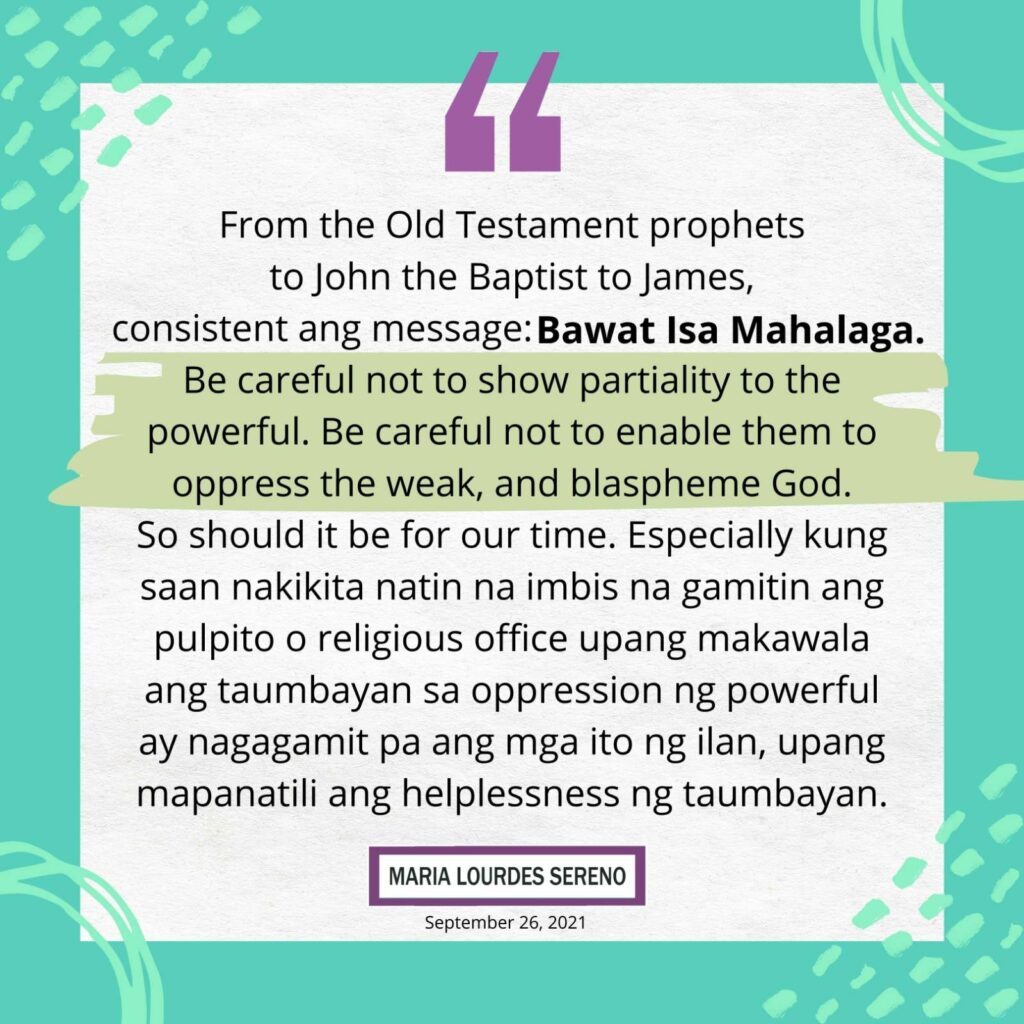ANG KAIBAHAN NG IDOLATRY OF POLITICAL LEADERS AT ANG RESPETONG KRISTIYANO NA DAPAT IBIGAY SA BAWAT TAO
By Maria Lourdes Sereno

Ano ang pinakamatinding warning na galing sa mga first followers ni Hesus ukol sa pakikitungo ng mananampalataya sa mga makapangyarihan?
Ito po ang klarong instruction ni James sa chapter 2:1-9.
“…(D)o not hold the faith of our Lord Jesus Christ, the Lord of glory, with partiality. For if there should come into your assembly a man with gold rings, in fine apparel, and there should also come in a poor man in filthy clothes, and you pay attention to the one wearing the fine clothes and say to him, “You sit here in a good place,” and say to the poor man, “You stand there,” or, “Sit here at my footstool,” have you not shown partiality among yourselves, and become judges with evil thoughts ? … Has God not chosen the poor of this world to be rich in faith and heirs of the kingdom which he promised to those who love Him? But you have dishonored the poor man. . .”
May mabibigat pa pong warning si James tungkol sa maling deferential treatment sa mga rich, which we consider as warnings to everyone and not a general condemnation of the rich:
“Do not the rich oppress you and drag you into the courts? Do they not blaspheme that noble name by which you are called?”
Ang poor in James’ time had the same status as the Filipino poor of today: powerless. Kaya’t giit ni James na yung powerlessness ng poor which made them rich in faith and open to the promises of God to them, should be honored. At yung rich, who are of the powerful class, na nag-eexploit ng poor should not be given a place of honor sa gatherings nila, but should be treated like everyone else. Huwag magpakita ng partiality sa powerful.
Baligtad sa ibang churches ngayon. Napaka-strict sa personal life ng members: bawal ang ganito, bawal ang ganyan. Pero ang powerful, whether a member or not, kahit shameless na pagnanakaw na ang ginagawa, at scandalous na ang public behavior promoting lahat ng kalaswaan, ang sinasabi pa rin: “Welcome, brother, sister.”
Ipinagmamalaki pa na kasama sila sa fellowship, ngunit hindi man lang pinapaalala sa kanila ang proofs of repentance, the way that John the Baptist emphasized authenticity in believers’ lives:
“First, produce fruits worthy of repentance. And do not begin to say, Abraham is our father. For I say to you that God is able to raise up children to Abraham from these stones.” (Luke 3:8)
At nung na-alarm ang mga tao sa warning ni John the Baptist na baka covered nga sila sa “brood of vipers” na label na ibinIgay ni John sa mga fake na nag-repent, at humingi sila ng pointers kung ano nga talaga ang dapat nilang gawin, ito ang sabi ni John:
To everyone: “He who has two tunics, let him give to him who has none; and he who has food, let him do likewise.” (verse 11, same chapter)
To tax collectors: “Collect no more than what is appointed for you.” (verse 13)
To the soldiers: “Do not intimidate anyone or accuse falsely, and be content with your wages.” (verse 14)
Sobrang relevant po ng mensaheng ito ni John the Baptist sa ating panahon, ano po? Including yung sa tax collectors at soldiers.
From the Old Testament prophets to John the Baptist to James, consistent ang message, Bawat Isa Mahalaga. Be careful not to show partiality to the powerful. Be careful not to enable them to oppress the weak, and blaspheme God. So should it be for our time. Especially kung saan nakikita natin na imbis na gamitin ang pulpito o religious office upang makawala ang taumbayan sa oppression ng powerful, ay nagagamit pa ang mga ito ng ilan, upang mapanatili ang helplessness ng taumbayan.
